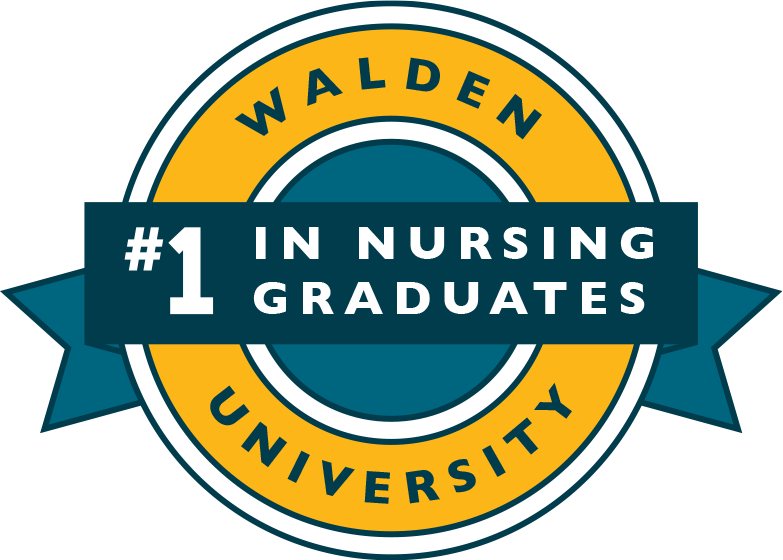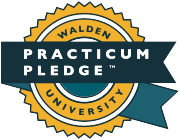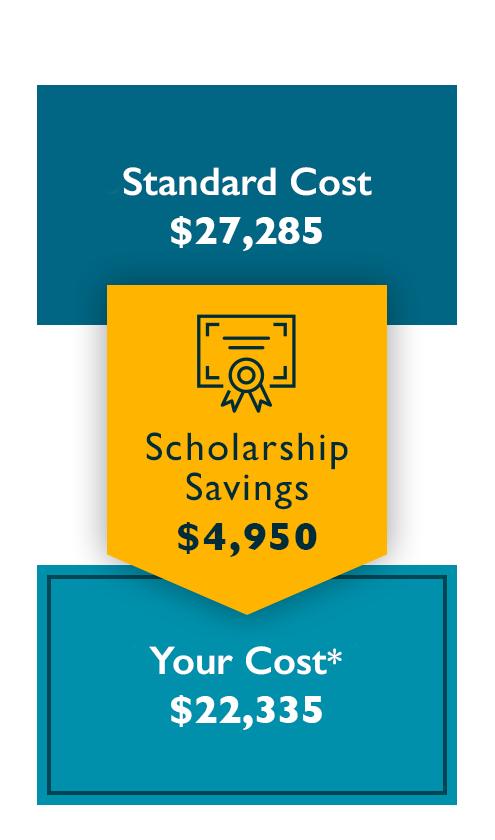Choose the BSN to MSN track if you are a registered nurse (RN) and have already earned your Bachelor of Science in Nursing (BSN) degree.
Curriculum
Degree Completion Requirements
- 53 quarter credits
- Core courses (23 cr.)
- Specialization courses (30 cr.)
View the COMPLETE CURRICULUM PLAN
This sequence represents the minimum time to completion. Time to completion will vary by student, depending on individual progress and credits transferred, if applicable. For a personalized estimate of your time to completion, call an Enrollment Specialist at 844-937-8785.
Choose the RN to MSN track if you are a registered nurse (RN) entering the MSN program with a hospital diploma or an associate degree in nursing.
Curriculum
Degree Completion Requirements
- 79 quarter credits
- Foundations courses (26 cr.)
- Core courses (23 cr.)
- Specialization courses (30 cr.)
View the COMPLETE CURRICULUM PLAN
This sequence represents the minimum time to completion. Time to completion will vary by student, depending on individual progress and credits transferred, if applicable. For a personalized estimate of your time to completion, call an Enrollment Specialist at 844-937-8785.
If you are a registered nurse (RN) and have earned your bachelor's in nursing degree, you can use these tracks to get started on your doctoral nursing degree.
Add an MBA to our MSN
UNLOCK YOUR BUSINESS POTENTIAL
Gain in-depth insights into nursing leadership and business management with Walden's new, streamlined MSN to MBA path.
- Earn your MSN and then complete your MBA in as few as 12 months.*
- Apply up to three courses from your MSN program to your MBA program.*
Questions? Our Enrollment Specialists are here to give you answers.
*Walden Master of Science in Nursing (MSN) graduates can transfer up to four courses into the Master of Business Administration (MBA) program with a Self-Designed specialization and complete the program in as few as nine months, depending on MSN program specialization . Tuition and time to completion for those with an MSN from another university may vary depending on individual progress and credits transferred, if applicable. Tuition and time to completion may be reduced if transfer credits are accepted, or if you receive grants, scholarships, or other tuition reductions.
With Tempo Learning, you may be able to complete your MSN degree in as few as 14 months for as low as $13,000 for select specializations.*
*Represents BSN-MSN option, Tempo Learning® format, Believe & Achieve Scholarship, and the fastest pace of our top 25% transfer students in this program in the Tempo Learning® format. Your actual total program time and costs may vary. Tuition and fees are subject to change. See Scholarship Details for more information.
Admission Requirements
Program Admission Considerations (RN-MSN): Registered nurses who hold a hospital diploma, associate degree in nursing, or bachelor’s degree (other than BSN)
Program Admission Considerations (BSN-MSN): A bachelor's degree or higher.
General Admission Requirements: Completed online application and transcripts.
More information for international applicants.
Personalized Practicum Support
After you register for the Walden University Practicum Pledge™ (along with other requirements), if you can’t identify a site and preceptor, our dedicated Field Placement Team partners with you to secure your site and preceptor to help you find a match. This enhanced support gives you added confidence as you start your degree journey.
| Curriculum Component | Requirements | Cost | AMOUNT |
|---|---|---|---|
| Tuition | 53 quarter credit hours | $495 per quarter hour | $26,235 |
| Program Fee | Per quarter | $175 | $1,050 |
| $27,285* | |||
| BELIEVE & ACHIEVE SCHOLARSHIP YOUR TUITION | -$4,950 $22,335†* | ||
*Tuition reflects the minimum time to completion. Time to completion varies by student, depending on individual progress and credits transferred, if applicable. Tuition and time to complete may be reduced if transfer credits are accepted, or if you receive grants, scholarships, or other tuition reductions. Walden may accept up to 25 transfer credits. For a personalized estimate of the number of your transfer credits that Walden would accept, call an Enrollment Specialist at 844-768-0109.
Tuition and fees are subject to change. Books and materials are not included and may cost between $1,500 to $2,000. Students may also incur additional costs related to practicum, including but not limited to costs of travel to their practicum site, practicum onboarding fees, per quarter practicum fees, and liability insurance costs.
†*Represents course-based learning format, BSN-MSN track, no optional sub-specializations, minimum time to completion, and Believe & Achieve Scholarship. Your actual total program time and costs may vary. Believe & Achieve Scholarship savings based on current tuition. See Scholarship Details for more information.
| Curriculum Component | Requirements | Cost | AMOUNT |
|---|---|---|---|
| Tuition | 26 RN Foundational quarter credit hours | $425 per quarter hour | $11,050 |
| 53 MSN quarter credit hours | $495 per quarter hour | $26,235 | |
| Program Fee | Per quarter | $175 | $1,400 |
| $38,685* | |||
| BELIEVE & ACHIEVE SCHOLARSHIP YOUR TUITION | -$4,950 $33,735†* | ||
*Tuition reflects the minimum time to completion. Time to completion varies by student, depending on individual progress and credits transferred, if applicable. Tuition and time to complete may be reduced if transfer credits are accepted, or if you receive grants, scholarships, or other tuition reductions. Walden may accept up to 35 transfer credits. For a personalized estimate of the number of your transfer credits that Walden would accept, call an Enrollment Specialist at 844-768-0109.
Tuition and fees are subject to change. Books and materials are not included and may cost between $1,500 to $2,000. Students may also incur additional costs related to practicum, including but not limited to costs of travel to their practicum site, practicum onboarding fees, per quarter practicum fees, and liability insurance costs.
†*Represents course-based learning format, RN-MSN track, minimum time to completion, and Believe and Achieve Scholarship. Your actual total program time and costs may vary.
Walden’s Tempo Learning® program options follow a subscription-based pricing format. Students are billed a flat rate for each three-month subscription term. All pricing is represented in U.S. dollars and is subject to change.
| Program | Subscription Period Tuition | Subscription Period PROGRAM Fee | Subscription Period Time Frame |
|---|---|---|---|
| Master of Science in Nursing (MSN) | $3,000** | $175 | 3-month subscription period |
| You may be able to complete your MS in Nursing degree in 14 months for under $13,000 for select specializations.* | |||
*Represents Tempo Learning® format, BSN-MSN option, Believe & Achieve Scholarship, and the fastest pace of our top 25% transfer students in this program in the Tempo Learning® format. Your actual total program time and costs will depend on your individual pace and transfer credits. A student’s pace is usually determined by their experience, ability to work independently, and availability. Believe & Achieve Scholarship savings based on current tuition. See Scholarship Details for more information.
**The MSN-Nurse Education specialization requires one additional hard-copy textbook. The cost of this textbook is not included in the three-month subscription price. Students will be required to obtain this textbook directly from the publisher at a cost of approximately $55.00.
Financial Aid
Financial aid is available for this program. Our financial aid advisors can help you identify funding opportunities to help you pay for your education.
Program Outcomes
Prepare Nurses to Thrive in Their Practice
In our MSN in Nursing Education online program, you’ll prepare to help new and experienced nurses reach the next level of the profession. Explore how to design effective curriculum that enables nurses to make a positive difference for patients. Gain the skills to lead innovative educational efforts in your facility for nursing staff, providers, and patients.
Coursework in this degree program aligns with the National League of Nursing (NLN) standards for nurse educators and the Association for Nursing Professional Development (ANPD). Optional certification for nurse educators is offered through the National League of Nursing (NLN).
Career Impact
Nurse educators are in demand, with jobs expected to grow by 18% through 2032, according to the U.S. Bureau of Labor Statistics.1
An MSN in Nursing Education can pave your way to a rewarding future. Impact the lives and careers of nurses and the quality of patient care. Position yourself for new job opportunities in a nurse educator role teaching nursing students, patients, and staff. Drive positive change within your healthcare facility and your community.
Career options for nurse educators: 2
- College nursing faculty
- Administrative nurse faculty
- Nursing professional development specialist
- Nursing instructor or educator
- Program Coordinator
- Clinical practice and education specialist
- Orientation specialist
Career options may require additional experience, training, or other factors beyond the successful completion of this degree program.
Learning Outcomes
As a graduates of this MSN in Nursing Education online program, you’ll be prepared to:
- Synthesize organizational/systems leadership for cost-effective specialist nursing practice that contributes to high-quality healthcare delivery, advancement of the nursing profession, and social change.
- Critique evidence-based literature drawing from diverse theoretical perspectives and pertinent research to guide decision making that demonstrates best practices for specialist nursing practice in a global society.
- Integratively assess, diagnose, plan, implement, and evaluate cost-effective healthcare strategies that reduce health disparities by patient/population advocacy for access to specialist nursing care.
- Demonstrate the ability to effectively communicate using audience-specific oral, written, and information technology for professional delivery of specialist nursing care.
- Evaluate health needs of diverse populations for necessary teaching/coaching functions based on specialist nursing knowledge to restore/promote health and prevent illness/injury.
- Exhibit ongoing commitment to professional development and value of nursing theories/ethical principles (altruism, autonomy, human dignity, integrity, social justice) in accordance with ethically responsible, legally accountable, specialist nursing practice.
- Implement specialist nursing roles to promote quality improvement of patient-centered care in accordance with professional practice standards that transform health outcomes for diverse populations.
Testimonials
I chose Walden to earn my advanced degree because I was pleased with the design and presentation of the curriculum, its flexibility, and the very encouraging reviews of the experiences of current students and alumni.
I was very surprised about how well-prepared I felt for my certification boards after graduation. The program prepared me for entry to practice.
Choosing to specialize as a family nurse practitioner has opened many doors. ... I can explore many areas in nursing and still be a nurse practitioner.
FAQ About Walden's Master of Science in Nursing (MSN) Education Specialization
Online education offers an accessible way for working nurses to advance their career. When you decide to earn your Master of Science in Nursing (MSN) from an online university, you can complete your coursework from wherever you have an internet connection. Plus, online MSN programs let you choose when in the day you attend class, providing you with the level of flexibility you need to complete your master’s in nursing while you continue to work full time. Walden’s MSN program with a specialization in Nursing Education is delivered through an online learning platform that connects you with expert faculty and the resources and support you need to be successful throughout your program and beyond.
An MSN–Nursing Education degree prepares you to become a teacher, mentor, and leader in hospitals, academic settings, community health organizations, consulting firms, and corporations. The degree also opens up opportunities for advancement and new career paths by allowing you to contribute to the professional development of other nurses to improve patient outcomes. As a nurse educator, you will be able to train new nurses and help shape the future of the nursing workforce. In a professional development role, you will also be contributing to the maintenance of your nursing staff’s clinical competency. Similarly, if working closely with patients is how you want to put your nursing education to use, a career as a patient educator may be right for you. Nurse educators may also conduct research, write published materials and studies, participate in professional organizations, and attend conferences.
While a nurse educator must at least be certified as a registered nurse, many have advanced degrees such as a Master of Science in Nursing (MSN). If you have years of experience in nursing and are passionate about training and mentoring the next generation of registered nurses, now may be the time to go back to nursing school to earn your MSN. When you enroll in Walden University’s MSN program with a specialization in Nursing Education, you’ll learn to design, implement, evaluate, and revise educational programs for nurses.
In order to earn a credible Master of Science in Nursing (MSN) degree, you need to attend a university with an accredited MSN program. Specifically, you should look for Commission on Collegiate Nursing Education (CCNE) accreditation. CCNE is a national accreditation agency focused on assuring the quality and integrity of nursing degree programs and residency programs. When a university’s programs have CCNE accreditation—like Walden University’s BSN, MSN, and DNP programs—you can be assured it provides nursing education that meets the highest standards.
Content will focus on curriculum development, digital learning experiences, leadership in nursing education, assessment, and more. There are six specialization topics in Nursing Education that you will focus on at Walden, whether you choose the course-based or the Tempo Learning® option. Two of the courses are:
Teaching Learning Strategies: Integrating Technology Into Nursing Education
- Integrate technology tools and develop lessons to support the diverse learning needs and ethical considerations of different groups of learners, including nursing students, staff, patients, and caregivers.
- Learn how to plan and create lessons as well as evaluate strategies for a variety of learning environments and learner characteristics.
- Adapt a face-to-face lesson for a digital learning environment.
Curriculum Development, Assessment, and Evaluation
- Learn how the educational environment in higher education and healthcare settings is influenced by social, economic, regulatory, and technological transformations.
- Understand the theoretical foundations that drive curriculum development, assessment, and evaluation.
- Study the different components of curriculum, which include societal, professional, and educational trends that affect nursing education curricula.
Until recently, nurses moving from RN to MSN had to first enroll in and complete a BSN program and then enroll in and complete a full MSN program. Now, with the RN to BSN to MSN accelerated option, you can streamline the process. Through most RN to BSN to MSN program tracks, once you earn the BSN degree, you can enroll in the master’s program having already earned credits toward your MSN. Those transfer credits may make it possible for you to complete your MSN program up to six months sooner than if you entered a non-accelerated program track.
Walden’s program is developed by industry experts who have been working in the field as nurse educators. This ensures that the program will cover relevant scenarios and actual skills needed. Our online classrooms feature state-the-art learning technologies, media, and support materials. You will also have access to virtual reality technology, engaging case studies, and a robust online library.
The Nursing Education specialization’s content is consistent with the National League for Nursing (NLN) standards for nurse educators and aligned with the Association for Nursing Professional Development (ANPD) standards. Students in Walden’s online MSN with a Nurse Education specialization will be academically prepared to sit for the Certified Nurse Educator (CNE®) exam through the NLN upon graduation. Qualifications to sit for certification exams are determined by the certifying body.
1Bureau of Labor Statistics | Occupational Projections Data (Nursing instructors and teachers, postsecondary, SOC Code 25-1072)
2American Nurse | Career options for Nurse Educators
Commission on Collegiate Nursing Education (CCNE)
The baccalaureate degree program in nursing (BSN), master’s degree program in nursing (MSN), post-graduate APRN certificate program, and Doctor of Nursing Practice (DNP) program at Walden University are accredited by the Commission on Collegiate Nursing Education (www.ccneaccreditation.org).
Program Note: The MSN program with a specialization in Nurse Executive, Nursing Education, Nursing Informatics, or Public Health Nursing is not a licensure-leading program and will not prepare students as nurse practitioners.
Note on certification: Walden’s MSN program is designed to provide the academic degree required to apply for national certifications. Because no graduate program can guarantee that graduates will achieve national certification, we encourage students to consult the appropriate credentialing center for the specific requirements. It is an individual’s responsibility to understand, evaluate, and comply with all requirements relating to national certification as requirements vary widely. Walden makes no representations or guarantee that completion of Walden coursework or programs will permit an individual to obtain national certification. For more information about certification programs, students should contact the American Nurses Credentialing Center at www.nursingworld.org/ancc, or other certification websites.
Note on Competency-Based MSN Specializations
Walden University is currently unable to accept applications for the competency-based MSN specializations in Nurse Executive, Nursing Education, and Nursing Informatics from residents of the following states: Alaska, New York, and Rhode Island.
Walden University’s competency-based options are priced as an all-you-can learn model, where students subscribe to three-month learning periods instead of paying for courses or credit hours. Walden offers monthly starts, the first Monday of every month, for the competency-based option.
Note on Field Experience and Relocating
Students who are considering relocating are advised to contact their Student Success Advisor prior to any decision to relocate in order to determine how relocation may impact progress in their program. Advisors can provide information and guidance on how relocating may result in possible changes, restrictions, and/or additional requirements affecting field experience. Each Board of Nursing and Higher Education Authority governs the field experience rules and regulations in their respective states, and students may be unable to complete field experience in the state in which they plan to relocate. While Walden is committed to working collaboratively with students to secure field sites across the United States, it is imperative that students contact their Student Success Advisor immediately when considering relocating.


















